An IRC (Internet Relay Chat) client is a program that a user can install on their computer and it sends and receives messages to and from an IRC server. It simply connects you to a global network of IRC servers and enables one-on-one and group communication.
There are still many users of IRC out there for one reason or another, though considered an old-fashioned way of online communication. But leaving the talk of it being relevant or not to users around the world.
There are several IRC clients that are actively being developed, that you can use on a Linux desktop, and in this article, we shall take a look at some of them.
1. WeeChat
WeeChat is a light, fast, highly extensible command-line-based and above all cross-platform chat client that runs on Unix, Linux, BSD, GNU Hurd, Windows, and Mac OS.
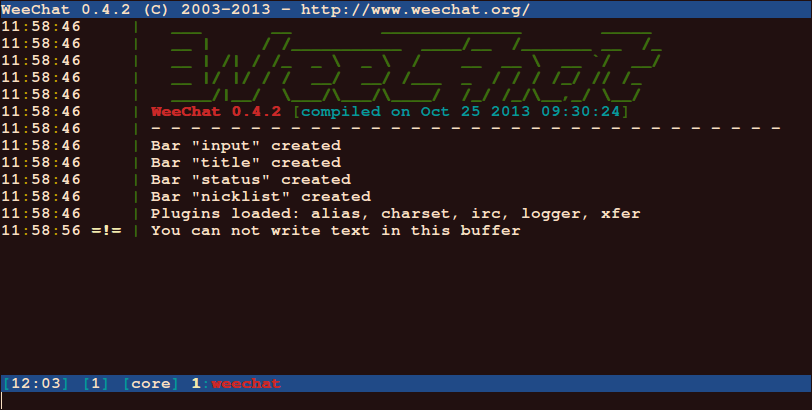
It has some of the following features:
- Modular and multi-protocol architecture
- Highly extensible with optional plugins
- Fully documented and active project
Install WeeChat on Linux
To install WeeChat on Linux, use the following appropriate command for your specific Linux distribution.
sudo apt install weechat [On Debian, Ubuntu and Mint] sudo yum install weechat [On RHEL/CentOS/Fedora and Rocky/AlmaLinux] sudo emerge -a sys-apps/weechat [On Gentoo Linux] sudo apk add weechat [On Alpine Linux] sudo pacman -S weechat [On Arch Linux] sudo zypper install weechat [On OpenSUSE] sudo pkg install weechat [On FreeBSD]
2. Pidgin
Pidgin is an easy-to-use, free, cross-platform chat client that enables users to connect to several chat networks simultaneously. Pidgin is more than just an IRC client, you can think of it as an all-in-one program for Internet messaging.
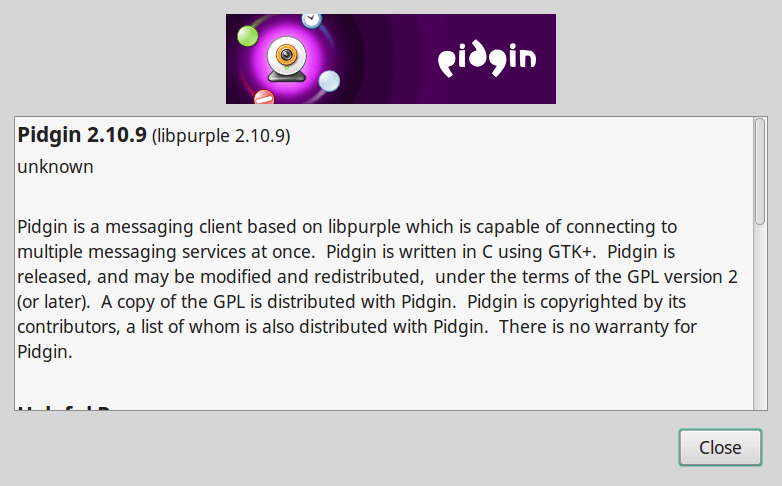
It supports multiple chat networks including AIM, Google Talk, Bonjour, IRC, XMPP, MSN plus many others that you can find from the Pidgin homepage and it has the following features:
- Supports multiple chat networks
- Highly extensible with plugins
- Integrates with the system tray on GNOME and KDE
- Free software with active development
Install Pidgin in Linux
To install Pidgin on Linux, use the following appropriate command for your specific Linux distribution.
sudo apt install pidgin [On Debian, Ubuntu and Mint] sudo yum install pidgin [On RHEL/CentOS/Fedora and Rocky/AlmaLinux] sudo emerge -a sys-apps/pidgin [On Gentoo Linux] sudo apk add pidgin [On Alpine Linux] sudo pacman -S pidgin [On Arch Linux] sudo zypper install pidgin [On OpenSUSE] sudo pkg install pidgin [On FreeBSD]
3. HexChat
Originally called XChat-WDK, HexChat is based on XChat, and unlike XChat, HexChat is free and can be used on Unix-like operating systems such as Linux, OS X, and also Windows.
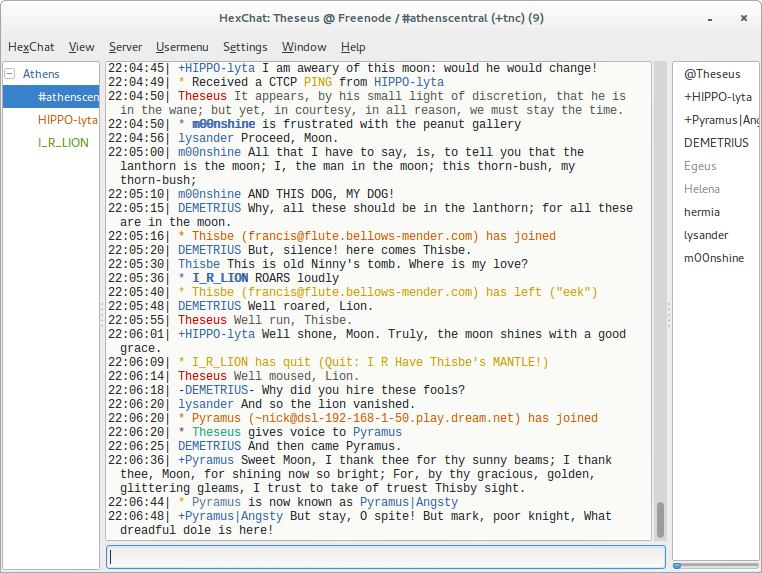
It is feature-rich including the following:
- Easy to use and highly customizable
- Highly scriptable with Perl and Python
- Fully open-source and actively developed
- Translated into several languages
- Multi-network with auto-connect, join, and identify functionalities
- Support for spelling check, proxies, SASL, DCC plus many more
Install HexChat on Linux
To install HexChat on Linux, use the following appropriate command for your specific Linux distribution.
sudo apt install hexchat [On Debian, Ubuntu and Mint] sudo yum install hexchat [On RHEL/CentOS/Fedora and Rocky/AlmaLinux] sudo emerge -a sys-apps/hexchat [On Gentoo Linux] sudo apk add hexchat [On Alpine Linux] sudo pacman -S hexchat [On Arch Linux] sudo zypper install hexchat [On OpenSUSE] sudo pkg install hexchat [On FreeBSD]
4. Irssi
Irssi is an easy-to-use command-line-based IRC client meant for Unix-like operating systems and supports SILC and ICB protocols through plugins.
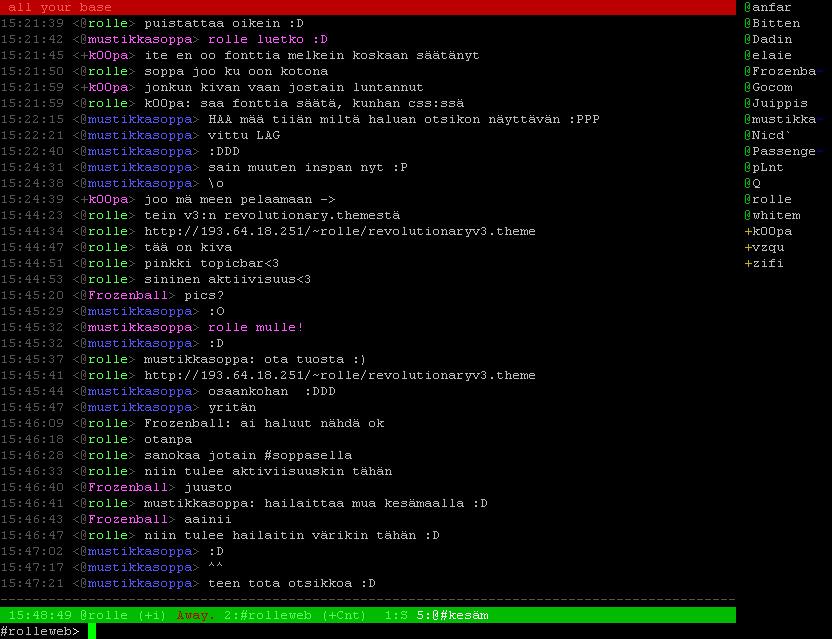
It has some amazing features and includes:
- Autologging
- Supports themes and formats
- Configurable keybindings
- Paste detection
- Support for Perl scripting
- Irssi proxy plugin
- Easy upgrades without losing connections
Install Irssi on Linux
To install Irssi on Linux, use the following appropriate command for your specific Linux distribution.
sudo apt install irssi [On Debian, Ubuntu and Mint] sudo yum install irssi [On RHEL/CentOS/Fedora and Rocky/AlmaLinux] sudo emerge -a sys-apps/irssi [On Gentoo Linux] sudo apk add irssi [On Alpine Linux] sudo pacman -S irssi [On Arch Linux] sudo zypper install irssi [On OpenSUSE] sudo pkg install irssi [On FreeBSD]
5. Konversation
Konversation is a user-friendly, fully-featured IRC client developed on the KDE platform but can also run on GNOME and other Linux desktops.
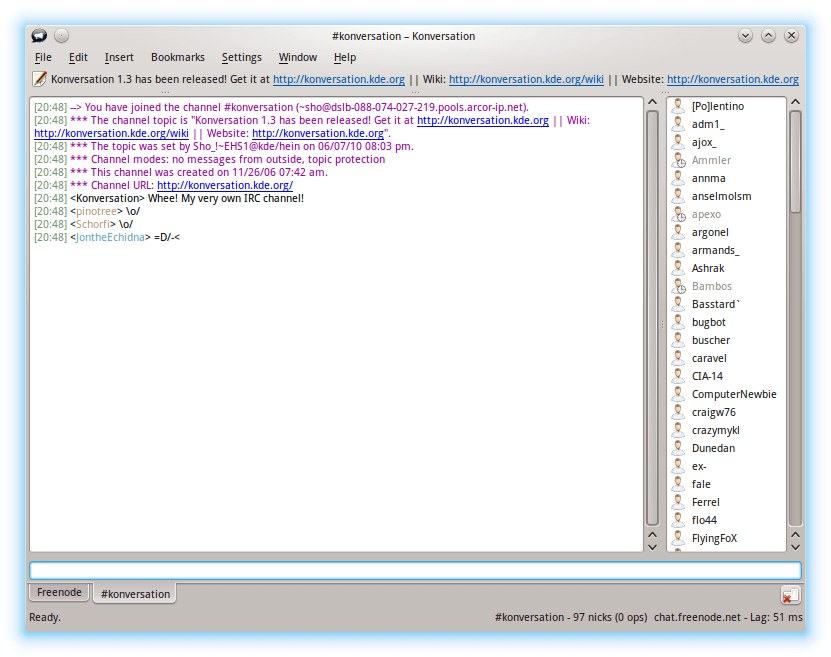
Konversation has the following features:
- standard IRC features
- Support for bookmarking
- Easy to use GUI
- Support for SSL server
- Several servers and channels in a single window
- DCC file transfer support
- Text decoration and colors
- On-screen notifications
- Highly configurable
- Automatic UTF-8 detection
- Per-channel encoding support
Install Konversation in Linux
To install Irssi on Linux, use the following appropriate command for your specific Linux distribution.
sudo apt install konversation [On Debian, Ubuntu and Mint] sudo yum install konversation [On RHEL/CentOS/Fedora and Rocky/AlmaLinux] sudo emerge -a sys-apps/konversation [On Gentoo Linux] sudo apk add konversation [On Alpine Linux] sudo pacman -S konversation [On Arch Linux] sudo zypper install konversation [On OpenSUSE] sudo pkg install konversation [On FreeBSD]
6. Quassel IRC
Quassel is a free, new fashion, cross-platform, distributed IRC client that works on Linux, Windows, and Mac OS X, you can think of it as a GUI replication of WeeChat.

At the time of this writing, the Quassel development team is still actively working to set up its features and if you visit the official website, you will realize that the features page has no content yet but it is actively being used.
Install Quassel in Linux
To install Irssi on Linux, use the following appropriate command for your specific Linux distribution.
sudo apt install quassel [On Debian, Ubuntu and Mint] sudo yum install quassel [On RHEL/CentOS/Fedora and Rocky/AlmaLinux] sudo emerge -a sys-apps/quassel [On Gentoo Linux] sudo apk add quassel [On Alpine Linux] sudo pacman -S quassel [On Arch Linux] sudo zypper install quassel [On OpenSUSE] sudo pkg install quassel [On FreeBSD]
7. Element – Secure Collaboration and Messaging
Element is a free and open-source All-in-one software instant messaging app that supports end-to-end encryption, group chats, video conferencing, voice calls, and sharing of files between users while working remotely.

Install Element on Debian, Ubuntu & Mint
To install Element on Debian-based distributions, use the following commands.
$ sudo apt install -y wget apt-transport-https $ sudo wget -O /usr/share/keyrings/riot-im-archive-keyring.gpg https://packages.riot.im/debian/riot-im-archive-keyring.gpg $ echo "deb [signed-by=/usr/share/keyrings/riot-im-archive-keyring.gpg] https://packages.riot.im/debian/ default main" | sudo tee /etc/apt/sources.list.d/riot-im.list $ sudo apt update $ sudo apt install element-desktop
8. Session Message
Session Message is a new encrypted secure private messenger application that offers a completely anonymous account without any number or email required.
All your chat messages are routed privately using online routing protocols that keep your messages secret, secure, and private.

If you use IRC, then having read this article, you must be ready to try some of these great IRC clients for Linux.
Make your choice right or you can try out all of them to determine which works best for you and remember to share your experience with other users around the world via the comment section below.








For the archlinux install, using yay with sudo it’s not a good idea.
Simply type:
yay -Shexchat since 2012 until now 2021 still failed to re-join a channel with a key. it will not reconnect. it never fixed.
I just saw that HexChat is going EOL.
Xchat is no longer maintained and is not available in the Debian and Ubuntu repositories any more.
What about Element (Matrix.org) and Session Message with Lokinet (kind of VPN, put “exit.loki” on exit node and then you are full anonymity and hide ip address). That both are open source.
Very good article.
A good list, but there are WAY more good clients these days. Most are pretty bloated in terms of features. I prefer the “suckless” options:
– sic (https://git.suckless.org/sic/)
– kirc (https://github.com/mcpcpc/kirc)
– rirc (https://github.com/rcr/rirc)
– birch (https://github.com/dylanaraps/birch)
pidgin is abandonware.
Yeah, that’s *not* the case.
This IRC article has brought me memories of good times. I used one client called Ninja Script and another called Avalanche Script. In addition to the standard mIRC client on Windows, because at the time I still did not know Linux.
Those are scripts, not IRC clients.